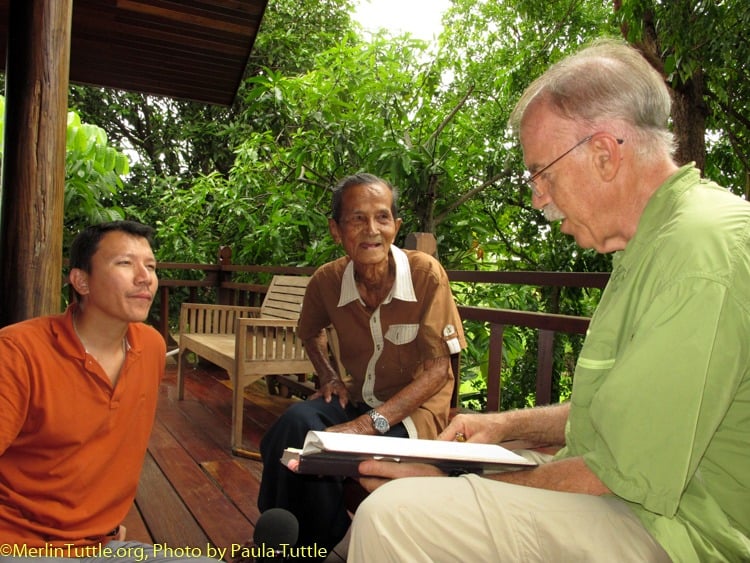Bat Flash: Countering Misinformation and Championing Evidence-Based Science
On March 6, 2024, the Wall Street Journal presented findings from the University of Leeds in their opinion piece, “Why Scientists Love Chasing Bats; The
The November 23, 2017 issue of THE CONVERSATION lures readers with an important sounding, bat-friendly title, “Can bats help humans survive the next pandemic?” However, two-thirds of the article is devoted to promoting fear instead of progress and is based on questionable sources. This is particularly disturbing given the publication’s stated objective—“Fight for Truth in Journalism.”
This story is a simple repeat of close to a decade of often exaggerated speculation attempting to link viruses found in bats to transmission of scary but relatively rare ones like SARS and MERS to humans. Documented transmission of any disease from bats to humans remains exceedingly rare. And no one has successfully shown transmission of SARS or MERS from bats to other mammals. Dromedary camels are now well known to have been the source of MERS in humans for decades, likely longer.
This story further repeats the poorly founded claim that bat species harbor more coronaviruses than any other group of mammals, assuming without validation, that this makes them uniquely dangerous. The claim is based on a study of fewer than half of the world’s bat families, presumably those that are the largest, most widespread and diverse, the ones most likely to harbor the highest viral diversity. These were then inappropriately assumed to be representative of the remainder that were less diverse and widely distributed as well as less colonial.
Sampled species were not reported, nor was their roosting or feeding behavior. Since the large majority of viral fragments detected came from feces, many could have come from arthropod carriers eaten by bats. This could falsely lead to the conclusion that bat vector controllers instead serve as reservoirs. Despite such biases, these results are now reported as documented facts.

One can only wonder how so many biases can be so consistently overlooked, despite historical evidence that huge bat colonies, even in cities, make safe and highly beneficial neighbors. Unfortunately, scaring us about bats has proven lucrative in gaining large research grants for projects of questionable value. It also seriously threatens some of our planet’s most endangered and valuable animals. Finally, this story provides no new discoveries of how bats might help prevent pandemics, as its title implies. Bats are indeed, largely immune to major human threats, such as cancer and arthritis, and when research objectives are revised, may provide a goldmine of useful discovery.
My comments can be seen at the end of THE CONVERSATION article. We encourage you to do the same in your own words by following the directions below. Also, we encourage you to freely contact the editors and authors of any similarly negative articles you find.
Remember, your response can be very simple such as, “I don’t appreciate attempts to create needless fear of bats.” Editors just need to know you like or dislike an article in order for you to have impact. It’s numbers that count. Bats need all of you!
Choose any or all means of contact to reach out to the staff at THE CONVERSATION and share your opinion about this unfair bias against bats in your own words.

Love our content? Support us by sharing it!
On March 6, 2024, the Wall Street Journal presented findings from the University of Leeds in their opinion piece, “Why Scientists Love Chasing Bats; The
Response to Misleading Scientific American Bat Story I am responding to the article titled, “A Secret Weapon in Preventing the Next Pandemic: Fruit Bats,” which
Believe it or not, bats have one of our planet’s finest records of living safely with humans. Despite frequent claims to the contrary, they harbor
The series Curious Kids, hosted by The Conversation, is designed to provide expert answers to questions asked by children from around the world. The December
2024 © Merlin Tuttle’s Bat Conservation. All rights reserved.
Madelline Mathis has a degree in environmental studies from Rollins College and a passion for wildlife conservation. She is an outstanding nature photographer who has worked extensively with Merlin and other MTBC staff studying and photographing bats in Mozambique, Cuba, Costa Rica, and Texas. Following college graduation, she was employed as an environmental specialist for the Florida Department of Environmental Protection. She subsequently founded the Florida chapter of the International DarkSky Association and currently serves on the board of DarkSky Texas. She also serves on the board of Houston Wilderness and was appointed to the Austin Water Resource Community Planning Task Force.
Michael Lazari Karapetian has over twenty years of investment management experience. He has a degree in business management, is a certified NBA agent, and gained early experience as a money manager for the Bank of America where he established model portfolios for high-net-worth clients. In 2003 he founded Lazari Capital Management, Inc. and Lazari Asset Management, Inc. He is President and CIO of both and manages over a half a billion in assets. In his personal time he champions philanthropic causes. He serves on the board of Moravian College and has a strong affinity for wildlife, both funding and volunteering on behalf of endangered species.